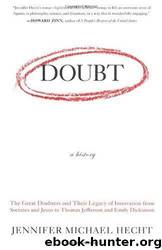Doubt: A History : The Great Doubters and Their Legacy of Innovation, From Socrates and Jesus to Thomas Jefferson and Emily Dickinson by Jennifer Michael Hecht

Author:Jennifer Michael Hecht
Language: eng
Format: mobi
Tags: Epistemology, Social Science, Philosophy, General, United States, Religion, Politics & State, World, History & Surveys, Belief and doubt, History
ISBN: 9780060097950
Publisher: HarperSanFrancisco
Published: 2004-08-25T20:00:00+00:00
THE HISTORICAL PROBLEM CALLED RABELAIS
A center of fresh doubt in these years was at the court of Margaret of Navarre. She lived from 1492 to 1549, right through the tumult of the new explorations, new religious movements, and the height of the Renaissance. A near-contemporary included the following story in his Lives of Illustrious Women: When one of her maids was fatally ill, Margaret sat by her bedside with such strange concentration that other ladies asked her “why she looked with so much attention on that poor dying creature.” Indeed, the queen “never stirred from [the girl’s] bed-side, as long as she was agonizing, looking her earnestly in the face, without interruption, till she was dead.” The reason, replied the queen to her ladies, was that she had heard many learned men assert that the soul left the body the moment it died. Queen Margaret wanted “to see if there came from it any wind or noise, or sound on the removal and going out of the soul,” but in the end, she reported, “she could perceive nothing like it.” It was a serious matter: “she added, that if she were not well settled in her faith she should not know what to think.” As it was, though, “she would believe what her God and her Church commanded her to believe.”22
As we started to see, at this time people thought of Italy as the breeding ground of atheists, and northern France was getting a bit of a reputation as well. Navarre, on the border of France and Spain was about to join them, and this had a lot to do with our Margaret of Navarre. A writer of stories, plays, and poems, she was best known for her Heptaméron (1558), an original collection of stories in the genre established by Boccaccio’s Decameron. Her brilliant court was frequented by literary men, among them the famous writers Etienne Dolet and François Rabelais, both of whom have been thought of as atheists for centuries. As queen consort of Navarre and sister of King Francis I of France, Margaret could do as she pleased to some degree. She was a strong supporter of religious liberty and mild church reform. Did she doubt? Did Dolet and Rabelais?
There is a historical fight over disbelief that centers on these two men. When Rabelais was alive, a lot of people called him an atheist, an “ape of Lucian,” and a drunk. He wrote books about two giants he invented—a father and son, Gargantua and Pantagruel—and he gave them lives full of messy carousing, complete with unceremonious sexual adventures, excretions, and general muck. These books were funny then and they are funny now. In them, many people make fun of priests, scripture, Church hierarchy, and ritual. What historians have gone back and forth on is what Rabelais himself actually believed.
At the end of the nineteenth century, a historian of great prestige, Abel Lefranc, known as “the commanding general of an army of Rabelais experts,” claimed that Rabelais was an aggressive atheist, barely hiding behind his literary veil.
Download
This site does not store any files on its server. We only index and link to content provided by other sites. Please contact the content providers to delete copyright contents if any and email us, we'll remove relevant links or contents immediately.
| Buddhism | Christianity |
| Ethnic & Tribal | General |
| Hinduism | Islam |
| Judaism | New Age, Mythology & Occult |
| Religion, Politics & State |
Cecilia; Or, Memoirs of an Heiress — Volume 1 by Fanny Burney(31348)
Cecilia; Or, Memoirs of an Heiress — Volume 3 by Fanny Burney(30947)
Cecilia; Or, Memoirs of an Heiress — Volume 2 by Fanny Burney(30907)
The Secret History by Donna Tartt(16656)
Sapiens: A Brief History of Humankind by Yuval Noah Harari(13072)
Leonardo da Vinci by Walter Isaacson(11915)
The Radium Girls by Kate Moore(10915)
Sapiens by Yuval Noah Harari(4551)
The Wind in My Hair by Masih Alinejad(4427)
How Democracies Die by Steven Levitsky & Daniel Ziblatt(4411)
Homo Deus: A Brief History of Tomorrow by Yuval Noah Harari(4288)
Endurance: Shackleton's Incredible Voyage by Alfred Lansing(3854)
The Silk Roads by Peter Frankopan(3777)
Man's Search for Meaning by Viktor Frankl(3647)
Millionaire: The Philanderer, Gambler, and Duelist Who Invented Modern Finance by Janet Gleeson(3575)
The Rape of Nanking by Iris Chang(3526)
Hitler in Los Angeles by Steven J. Ross(3446)
The Motorcycle Diaries by Ernesto Che Guevara(3344)
Joan of Arc by Mary Gordon(3269)
